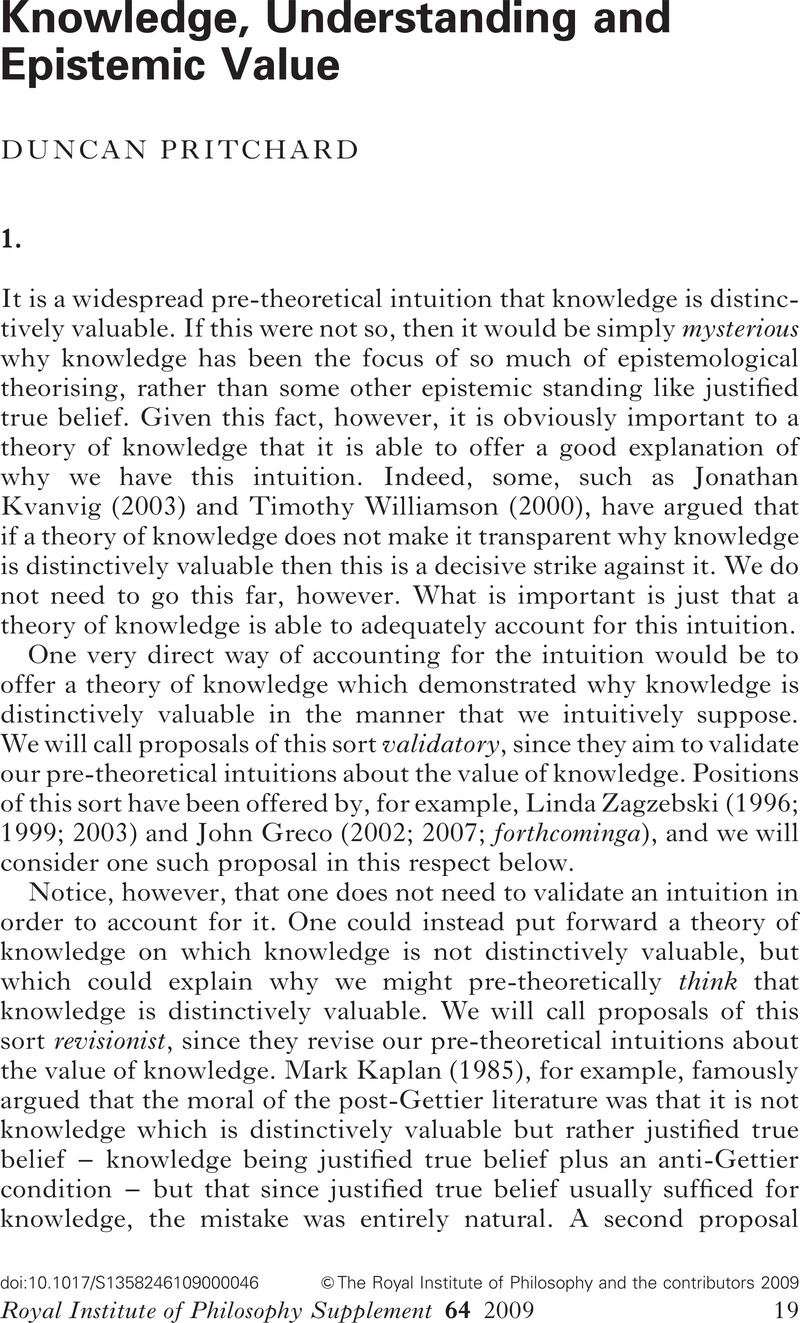Crossref Citations
This article has been cited by the following publications. This list is generated based on data provided by Crossref.
Khalifa, Kareem
2013.
UNDERSTANDING, GRASPING AND LUCK.
Episteme,
Vol. 10,
Issue. 1,
p.
1.
Kelp, Christoph
2014.
Virtue Epistemology Naturalized.
Vol. 366,
Issue. ,
p.
347.
Talbot, Brian
2014.
Truth promoting non-evidential reasons for belief.
Philosophical Studies,
Vol. 168,
Issue. 3,
p.
599.
Schwab, Whitney
2015.
Oxford Studies in Ancient Philosophy, Volume 48.
p.
1.
Adam Carter, J.
and
Pritchard, Duncan
2015.
Knowledge-How and Epistemic Value.
Australasian Journal of Philosophy,
Vol. 93,
Issue. 4,
p.
799.
Pritchard, Duncan
2015.
Anti-luck epistemology and the Gettier problem.
Philosophical Studies,
Vol. 172,
Issue. 1,
p.
93.
Hills, Alison
2016.
Understanding Why.
Noûs,
Vol. 50,
Issue. 4,
p.
661.
Lawler, Insa
2016.
Reductionism about Understanding Why.
Proceedings of the Aristotelian Society,
Vol. 116,
Issue. 2,
p.
229.
Wilkenfeld, Daniel A.
Plunkett, Dillon
and
Lombrozo, Tania
2016.
Depth and deference: When and why we attribute understanding.
Philosophical Studies,
Vol. 173,
Issue. 2,
p.
373.
Kallestrup, Jesper
and
Pritchard, Duncan
2016.
From Epistemic Anti-Individualism to Intellectual Humility.
Res Philosophica,
Vol. 93,
Issue. 3,
p.
533.
Carrassi, Mario
2016.
The Contribution of Love, and Hate, to Organizational Ethics.
Vol. 16,
Issue. ,
p.
123.
Paul, L. A.
2017.
First personal modes of presentation and the structure of empathy.
Inquiry,
Vol. 60,
Issue. 3,
p.
189.
Wilkenfeld, Daniel A.
2017.
Transformative Understanding Acquisition.
Res Philosophica,
Vol. 94,
Issue. 1,
p.
67.
Dellsén, Finnur
2017.
Understanding without Justification or Belief.
Ratio,
Vol. 30,
Issue. 3,
p.
239.
Dodd, Jordan
2017.
Hope, knowledge, and blindspots.
Synthese,
Vol. 194,
Issue. 2,
p.
531.
Mogensen, Andreas L.
2017.
Moral Testimony Pessimism and the Uncertain Value of Authenticity.
Philosophy and Phenomenological Research,
Vol. 95,
Issue. 2,
p.
261.
Pritchard, Duncan
2017.
Epistemically useful false beliefs.
Philosophical Explorations,
Vol. 20,
Issue. sup1,
p.
4.
Carter, J. Adam
2017.
VIRTUOUS INSIGHTFULNESS.
Episteme,
Vol. 14,
Issue. 4,
p.
539.
Pritchard, Duncan
2017.
Engel on pragmatic encroachment and epistemic value.
Synthese,
Vol. 194,
Issue. 5,
p.
1477.
Callahan, Laura Frances
2018.
Moral Testimony: A Re-Conceived Understanding Explanation.
The Philosophical Quarterly,
Vol. 68,
Issue. 272,
p.
437.



